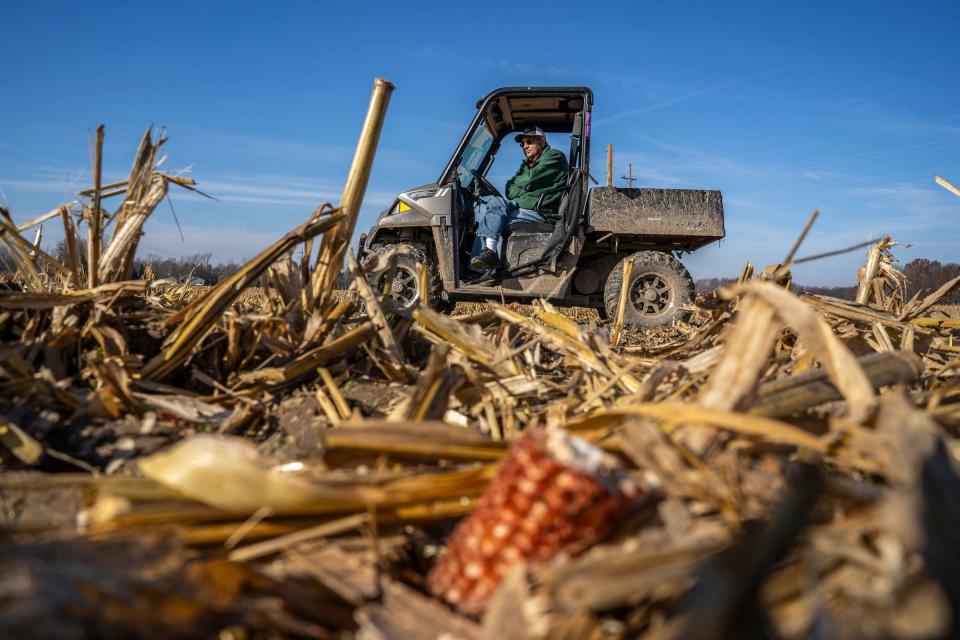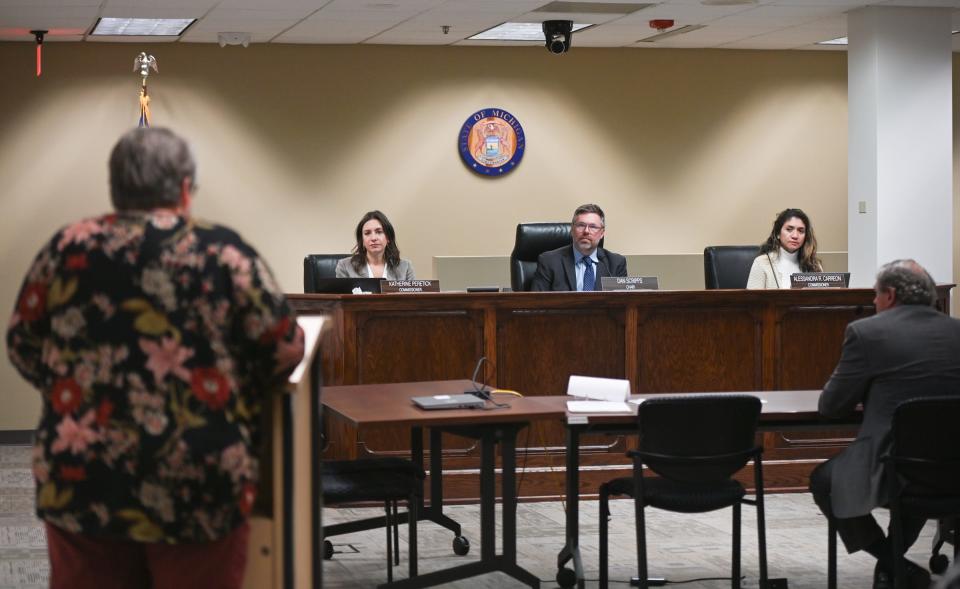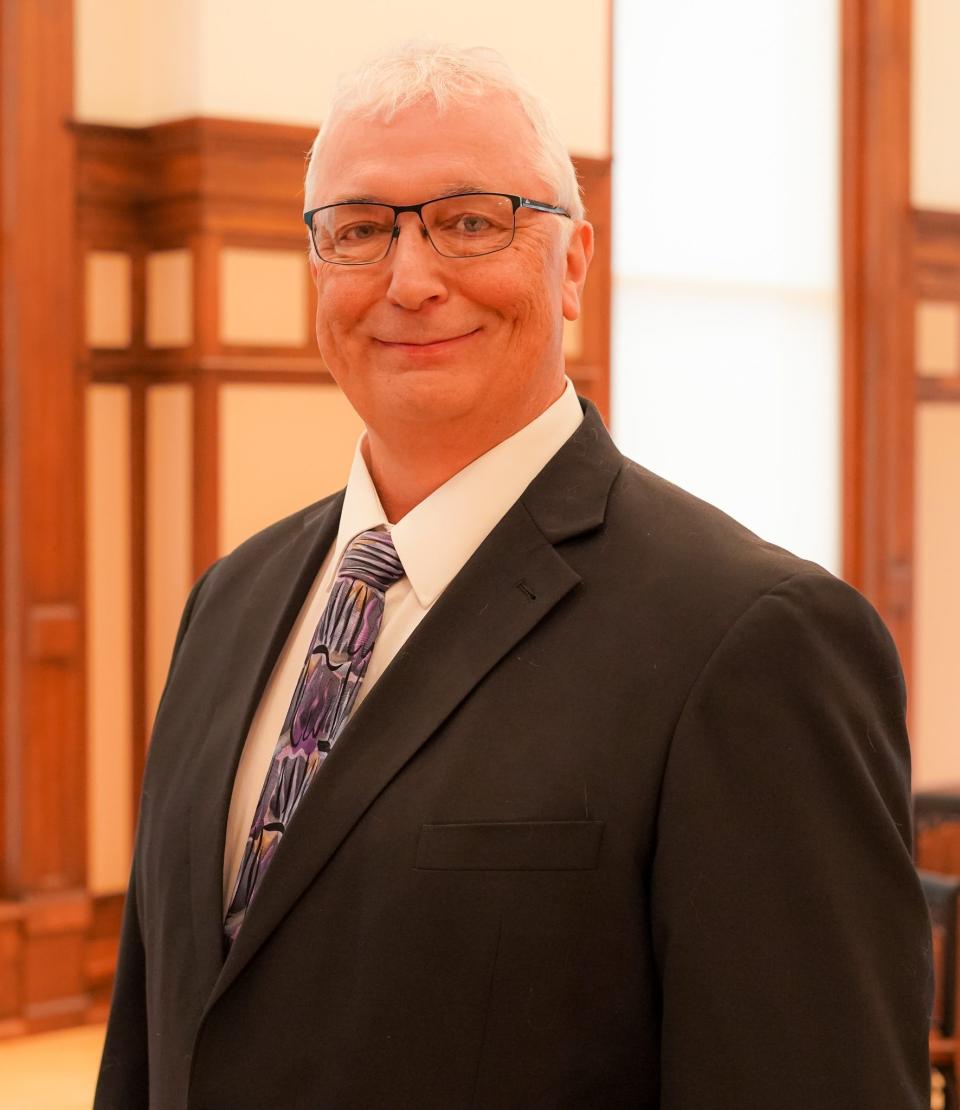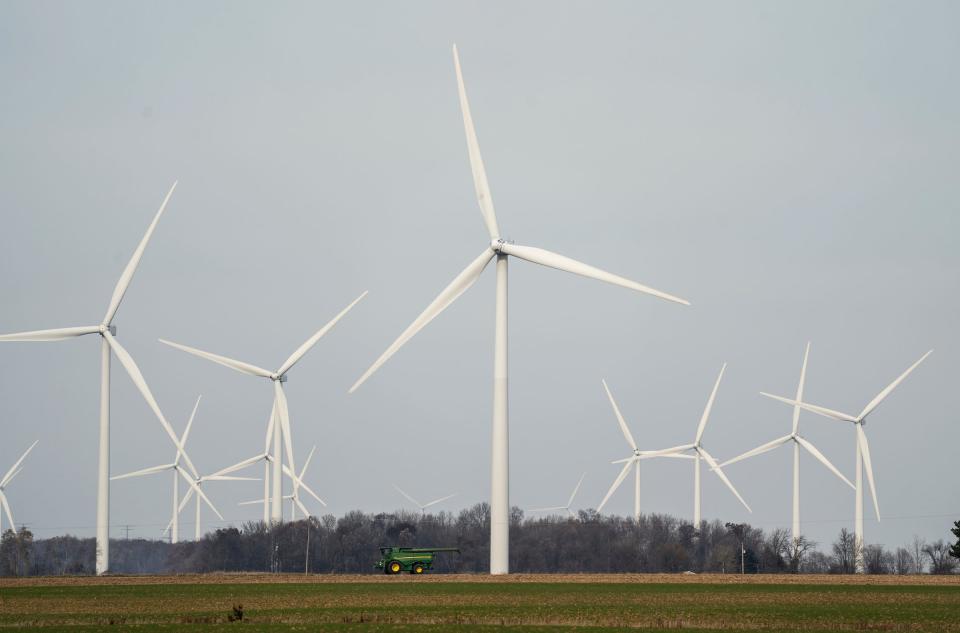Democrats' clean energy legislation sets up battle over local land use control
Lonnie Kester watched from a four-wheeler as farmhands worked to harvest corn from long rows of dried stalks on a sunny, unusually warm November day on Kester's farm in Millington Township, in Tuscola County in Michigan's Thumb. The longtime resident has sought for years to diversify into harvesting something else: the sun's carbon-free energy. But that hasn't proven easy.
Kester owns 2,300 acres of mostly farmland scattered over eight townships and three counties around Saginaw Bay. He has agreed to lease more than 1,500 acres for solar panels and battery storage facilities. He also sold 230 acres for a solar development in nearby Genesee County in July 2017. More than six years later, that project still hasn't gotten off the ground. "The township keeps moving the goal posts," he said.
Kester, 65, sees the solar developments on his land as his retirement income. "I don't have any other retirement," he said. "Farmers usually funnel most of their money back into their operation."

But local governments across the region, over the past several years, have largely rejected renewable energy projects. Township after township, occasionally in meetings that devolve into shouting matches, have passed moratoriums on wind and solar energy development, or zoning ordinances that make the projects unfeasible.
100% clean energy goal by 2040
As the state prepares to set new, aggressive clean energy goals that would require a dramatic scale-up of wind and solar development in Michigan, the leaders' method to resolve this local opposition is controversial: They intend to grant to the Michigan Public Service Commission, a three-person board appointed by the governor, the ability to site the projects itself, overriding local zoning and restrictive ordinances.
That measure is part of a package of bills passed by legislative Democrats on party-line votes earlier this month, along with bills that would take Michigan to a 100% "clean energy" standard across the state by 2040, with at least 60% required to come from renewable sources such as wind and solar power. Gov. Gretchen Whitmer, who expressed support for the measures earlier this fall and praised their passage, is expected to sign the legislation into law soon.

The Michigan Farm Bureau, Michigan Association of Counties and Michigan Association of Townships, among other groups, opposed the state giving itself siting authority for large-scale wind and solar projects.
"There are local zoning ordinances for reasons, and I don't think this legislation really takes that into account," said Deena Bosworth, director of government affairs for the Michigan Association of Counties.
"Residents across the state want to have a say in what's going into areas where they live," Bosworth said. "We respect private property rights, but the siting of utility-scale wind and solar without the local unit of government's ability to say no, we don't feel it is appropriate."
In St. Clair County's Wales Township, officials adopted an 18-month moratorium on wind and solar developments last February, as they work on ordinances related to both — drafts of which find that the development of wind and solar beyond what's necessary to meet the township's power generation needs would be detrimental to the community.
Some Wales Township property owners had already entered into lease agreements with Florida-based NextEra Energy Resources to develop 100 megawatts of solar power generation over 600 acres. In a statement in late May, NextEra spokesperson Alexis Jones said the company remains committed to developing in St. Clair County if it is able to move forward.
Township Supervisor Liz Masters called the proposal to allow the state to override local control on wind and solar development siting "an erosion of our democracy in Michigan."
"It's not about being opposed (to renewable energy development); it's letting the community decide."
But Masters made it clear she's no fan of such development there.
"To me, it's absolute industrial sprawl, the definition," she said.
Wind, solar projects concentrated in the Thumb
As wind and solar developers have looked for the best places to site utility-scale renewable energy projects in Michigan, over the past 15 or so years, they've looked to the Thumb and points west of it in the Lower Peninsula. Michigan has more than 3,100 megawatts of wind power generation, and all but a handful of the tall wind turbines are located in the vast agricultural farmland of the Thumb.
As wind turbines have become more difficult to site, renewable energy developers have increasingly turned to solar panel array projects. But now both have become points of contention in these rural areas.
In November 2022 elections, voters rejected a 75-turbine wind farm in Montcalm County and recalled seven township officials across three townships for their support of it. Zoning ordinances were similarly rejected in at least four townships for their support of renewable energy development.
In the Thumb's Huron County, voters in May 2017 faced two referendum votes, one on a 70-turbine, DTE Energy wind farm across multiple townships, and a NextEra Energy project in two additional townships. Pro-wind development campaigners spent more than $875,000 in cash and in-kind contributions toward the passage of the measures. The lone opposition group, Huron County Wind Resistance, spent just over $3,700. The two wind farm proposals were soundly defeated.
Commissioner considered wind, solar development's enemy
Perhaps the biggest villain in the state to those who want to transform Michigan to wind and solar power generation — or the biggest hero to those who oppose it in their backyard — is Kevon Martis. The Lenawee County commissioner is also zoning administrator in the county's Deerfield Township.

In 2009, in Lenawee's Riga Township, where Martis lives, a wind farm was proposed.
"We looked into it and saw the harms outweighed the benefits," he said. "More than anything, we felt wind turbines shouldn't be placed so closely to people's homes without them having the ability to offer some individual consent to that — to have the ability to negotiate for compensation for their obvious losses of amenity."
The township wrote an ordinance that allowed for that to happen. The wind developer found it unacceptable — and went away.
Soon, other officials from other townships were reaching out to Martis for help with their own ordinances to stave off Big Wind.
"People kept calling, and they still call," he said.
Do fossil-fuel interests back local-control advocate?
Martis has been involved in many local governments' efforts to oppose wind and solar development, providing PowerPoint presentations, talks, strategies. Wind and solar proponents accuse him of being on the payroll of petroleum interests; he denies it.
"If you really think I'm funded by fossil fuel money, come on down to my house; I'll get out my last 10 years of (IRS) Form 1040 and I'll split any fossil fuel money you find 50-50," he said.
The Energy and Policy Institute, a self-professed "watchdog organization working to expose attacks on renewable energy and counter misinformation by fossil fuel and utility interests," in a Nov. 8 posting to its website, challenged Martis' motivation. The post said that Our Home, Our Voice, a nonprofit, purportedly grassroots group involving Martis that opposes the bills allowing state siting of wind and solar projects, is affiliated with a public relations firm, Marketing Resource Group in Lansing, that’s represented Wolverine Pipe Line Co. for years.
The post also notes that Martis is listed as a senior fellow at the Energy & Environment Legal Institute, "a Virginia-based group that’s known for its coal industry funding and attacks on scientists who study the impacts of burning fossil fuels on the Earth’s climate."
Martis said of Our Home, Our Voice, "We're working solely on preserving local control on wind, solar, aggregates and short-term rentals. We're not getting into the energy discussion at all."
As for the fellowship at the legal institute, Martis said he was approached by the group almost 10 years ago.
"They liked my work on energy, and said they wanted to make me a senior policy fellow," he said. "At the time, I was testifying in Lansing and Columbus on energy issues.
"I took it. It came with no money, no direction, no responsibility, no nothing. It's an honorary title. I never received a dime; I don't know who funds them. I haven't talked with anybody there in about five years."
Strife, chaos and outsiders
Kester, the Millington farmer, is also chairman of the Tuscola County Planning Commission, which serves as an adviser on township zoning ordinances on matters such as making sure their language is legal. He said he speaks only for himself, not the commission.
"People are used to a way of life up here, and it's a good life up here," he said. "But some of our community is struggling. And instead of letting tax base come in (from renewable energy projects), sometimes you get these folks from out of town, or even out of state, and they create chaos."

Kester characterized Martis as such a pot-stirrer.
The ordinary citizens that make up township boards and planning commissions "don't like strife; they don't like chaos," Kester said."That's what some of these people like Kevon Martis like to create, to create an illusion that everybody is against it, and not everybody is against it. But the people that are for it, they don't come to the meetings because they don't want the chaos; they don't need it in their life."
Martis said he encourages residents to utilize strategies more typically associated with the environmental left.
"You've just got to shake your head when largely rural communities start to adopt these actions of protecting themselves and organizing in order to affect their desired outcome on a controversial land-use decision — that's stock-in-trade for PETA, the Sierra Club, Natural Resources Defense Council," he said. "Nobody's chaining themselves to bulldozers here. Nobody's defacing the Mona Lisa or whatever work of art it was in the Louvre.
"These people organize, they talk and they exercise the political options that the state law affords them — referendum, recall initiative, whatever it takes. Those are all lawful options. They are just mad at me for telling people that these options are available to them."
Windmill noise and health effects
Martis cites the World Health Organization's Guidance Development Group, which recommended reducing noise levels produced by wind turbines to below 45 decibels under a "day-evening-night" standard penalizing an additional 5 decibels for evening noise and an additional 10 decibels for nighttime noise. It's a standard that considers the noise to be more intrusive in the relatively quieter evenings and overnight than in the bustle of the day.
"Wind turbine noise above this level is associated with health effects," the WHO group stated.
Under the bills state Democrats just passed, wind and solar developers would be allowed projects emanating noise up to 55 decibels on average, with no evening or overnight consideration.
"Is it lies and fearmongering and scare tactics and intimidation to point out that the World Health Organization — that certainly shares the common concerns about climate change — says there is a known decibel number to this, and numbers above that are known to harm human health?" Martis said.
"The developers say, 'Oh, well, this is an industry standard.' What they mean is it's beneficial to them economically."
The height of wind turbines, often exceeding 600 feet, is jolting to a longtime farming community, Martis said.

"Most of these townships, when the wind company shows up, have a height limit in effect for all structures in the community except maybe a church spire of 40 feet," he said. "And the developer shows up and says, 'We want 650 feet' ... And we're not supposed to look askance at a proposal that's going to put 50, or 60, or 70 devices far taller than anything we've been permitted to build on our property for decades?"
Martis also rejects that opposition to large wind and solar development is NIMBYism, "Not In My Backyard." He noted that the Michigan Zoning Enabling Act exists to let local communities decide what goes where — and that zoning historically was prompted by environmental concerns.
"We look at the type of people that want to live here, and what they want their environment to look like," he said. "We've created zoning that permits that and affirms that, and zoning that discourages things contrary to that — just like the city of Ann Arbor does, like Hamtramck does, like Grand Rapids does. We all do that. That's normal. That's not extreme."
Siting bill author: 'Process is a fair one'
The clean energy bill package passed in Lansing was a "really huge lift, and it really bodes well for Michigan's energy future," said state Sen. Sean McCann, a Democrat from Kalamazoo.
McCann authored a Senate version of the bill allowing the Public Service Commission siting authority on utility-scale wind and solar and energy storage projects, though it was a compromise bill arising out of the House that was ultimately adopted by both chambers.
McCann said it's appropriate to treat the renewable energy projects as "critical energy infrastructure" like oil and gas pipelines and electrical transmission cables — amenities whose siting isn't left up to local governments.
"If we want to get to a better energy future; if we want decarbonization, the ability to site these projects is essential," he said.
McCann noted that wind and solar developers can still only work with those property owners with whom they reach a deal.

"You have cases that farmers and families who have owned land for generations, they have been inappropriately blocked from being able to do this in many cases across Michigan," he said.
The bill also contains provisions for a wind or solar developer to first negotiate with the local government for up to 120 days to try to reach a mutual agreement. The two sides can mutually agree to extend that period for another 120 days. Only if or when an agreement doesn't happen would the state get involved, unless a township wanted to defer to the state process by default.
"The process ultimately contained in these bills is a very fair one," he said. "It's fair and tilted toward local control as much as you can tilt, while still having the ability to overcome resistance that's not appropriate, or ordinances that simply make it impossible for any reasonable development to be installed. That's what this works around."
Whitmer, in her statement after the bills were passed, said, "I am grateful for the commonsense amendments that ensure local communities can work with utilities on developing clean energy sites."
Township-imposed restrictions on a renewable energy project for things such as setbacks could be no more restrictive than state rules, unless both the township and the developer agreed to it.
Martis was dismissive of the process, calling the state's public service commissioners "ideologues" intent on large-scale renewable energy development on the big wind and solar developers' terms.
"Can you imagine a less fair venue for anybody than a township going in front of that kangaroo court?" he said. "'You can do it our way, or you can do it our way;' that's not a choice."
Brian Calka, DTE vice president of renewable energy, said the utility will still look to site renewable projects with willing hosts.
"We are not about going into a community that hates solar, hates wind, and trying to force it down their throat. That's not our business model," he said. "We have found there are plenty of cities, townships, landowners who want to lease their land to DTE for the buildout of solar projects."
Advocate makes conservative case for renewable energy
Ed Rivet II comes at renewable energy development in Michigan from a different angle.
Rivet is executive director of the Michigan Conservative Energy Forum, a community-based advocacy group that walks and talks another line on advanced, clean energy.
"For a decade-plus, the entire debate was centered around climate change and environmentally based rhetoric," he said. "We just felt there were many other elements to energy that deserve a voice. ... We view the issues as a matter of national security, economic development and opportunity."
The forum runs the Land and Liberty Program, which does fieldwork in local areas as they consider large-scale wind and solar projects.
Rivet says the state taking overriding control of wind and solar siting "is not the approach we would have taken," but called the current situation "untenable."
"It's one thing to come out say, 'We are opposed to this in our township;' it's another thing to threaten people, threaten lawsuits, to blackmail local businesses because they are somehow connected to a local planning commission member or township board member who has to vote on this," he said. "Threatening boycotts against someone's store or business because they might support a wind or solar project.
"As long as they defeat the ordinance, they don't care if there is scorched earth left behind. They don't care if people who were friends for 40 years no longer talk to one another. They just killed the project.
"If we have to change the law to change that dynamic at the local level, so be it."
Contact Keith Matheny: kmatheny@freepress.com.
This article originally appeared on Detroit Free Press: Clean energy bills set up state override of wind, solar-resistant localities

